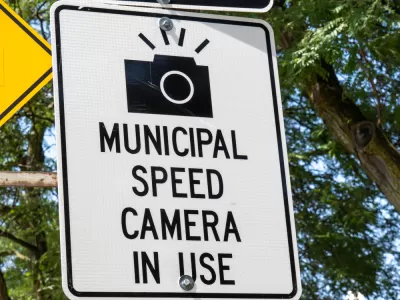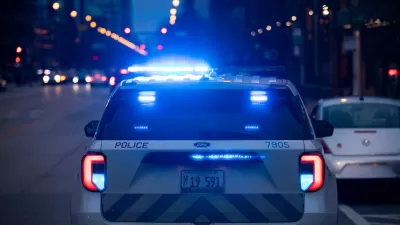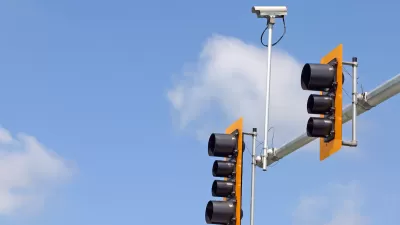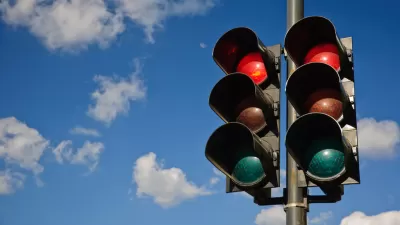There might be good reasons to oppose speed cameras and red light cameras—but racial justice is not one of them.

Historically, American cities have relied on the police to enforce traffic laws. But police enforcement of traffic laws doesn’t always work very well, for the simple reason that even if the police are motivated to stop speeding, they cannot be everywhere. Moreover, police enforcement has an important negative side effect: sometimes police officers get trigger-happy and shoot innocent citizens. And when the public perceives this trigger-happiness to be a result of racial bias, public respect for the police deteriorates, which leads to race riots and (sometimes) escalating crime rates.
One possible solution to this problem is “safety cameras”—automated cameras that ensure that drivers who drive faster that the speed limit or who run red lights would get tickets by mail. This procedure would reduce the need for police enforcement, which means that fewer motorists will be shot by police. And if safety cameras are common enough and effective enough,* drivers will speed less and kill fewer people.
However, some people try to wokewash the status quo, by claiming that speed cameras are more likely to be used in black neighborhoods, and thus implying that speed cameras victimize Black people. This argument is wrongheaded for three reasons. First, drivers in Black neighborhoods are not necessarily Black; they might be white drivers coming from white suburbs. For example, in Buffalo, the East Side of the city is heavily Black, but it adjoins Cheektowaga, which is 81 percent white—and the suburbs east of Cheektowaga are whiter still. So if the East Side’s major intersections had speed cameras, many white drivers as well as Black drivers would be ticketed.
Second, if drivers in Black neighborhoods are Black, walkers in those neighborhoods are probably Black as well. So if safety cameras reduce car/pedestrian crashes, they are saving Black lives. Compared to traffic enforcement by police, safety cameras would lead to fewer dead Black motorists, and would (if effective) lead to fewer dead Black walkers as well. Thus, the status quo only makes sense if you believe that protecting the pocketbooks of careless motorists is more important than protecting the lives of both motorists and walkers.
Third, a recent study shows that safety cameras are in fact more popular among Black (and Hispanic) folks than among whites. The primary purpose of this study was to show that “an interpersonal racial justice frame increases stated support for cameras”—that is, that people were more likely to support safety cameras when pollsters suggested that cameras were likely to reduce racial bias in policing. But even among the control group (that is, the group that was asked about cameras without the “racial justice frame”)** most people, especially Blacks and Hispanics, were pro-camera. In particular, among the control group 68 percent of Blacks and 64 percent of Hispanics supported cameras, as opposed to 49 percent of Whites. (Among the “racial justice frame” respondents those percentages rose to 86, 88 and 66 percent respectively).
In sum, there might be technical reasons to oppose safety cameras—but racial justice isn’t one of them.
*One problem with automated enforcement is, of course, that not every intersection has a camera. Also, drivers who are determined to evade the law can do so by illegally covering up license plates.
**The control group was given the following question: “Some people suggest using traffic safety cameras on neighborhood and arterial streets. Cameras would be placed at dangerous intersections and along roadways with many crashes. Drivers who drive much faster than the speed limit or who run a red light would get a ticket by mail. The cameras would run 24-hours a day. Based on the previous description, would you vote to approve traffic safety cameras in your community?” This wording seems somewhat biased to me, because it emphasizes the benefits of speed cameras; however, I see no reason why this would increase positive responses among Black respondents more than it would increase positive responses among other groups.

Trump Administration Could Effectively End Housing Voucher Program
Federal officials are eyeing major cuts to the Section 8 program that helps millions of low-income households pay rent.

Planetizen Federal Action Tracker
A weekly monitor of how Trump’s orders and actions are impacting planners and planning in America.

Ken Jennings Launches Transit Web Series
The Jeopardy champ wants you to ride public transit.

California Invests Additional $5M in Electric School Buses
The state wants to electrify all of its school bus fleets by 2035.

Austin Launches $2M Homelessness Prevention Fund
A new grant program from the city’s Homeless Strategy Office will fund rental assistance and supportive services.

Alabama School Forestry Initiative Brings Trees to Schoolyards
Trees can improve physical and mental health for students and commnity members.
Urban Design for Planners 1: Software Tools
This six-course series explores essential urban design concepts using open source software and equips planners with the tools they need to participate fully in the urban design process.
Planning for Universal Design
Learn the tools for implementing Universal Design in planning regulations.
Ada County Highway District
Clanton & Associates, Inc.
Jessamine County Fiscal Court
Institute for Housing and Urban Development Studies (IHS)
City of Grandview
Harvard GSD Executive Education
Toledo-Lucas County Plan Commissions
Salt Lake City
NYU Wagner Graduate School of Public Service






























